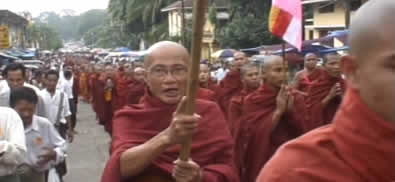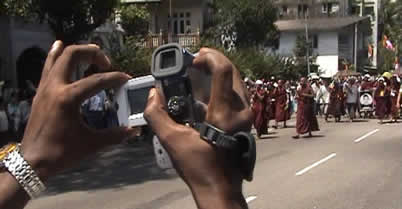Los Angeles, California – Tonight Burma VJ directed by Anders Ostergaard and produced by Lise Lense Moller won the OSCAR for the Best Documentary Feature at Academy Awards ceremony.
Cinema Without Borders’ Editor in Chief had a CWB exclusive interview with both Anders Ostergaard and Lise Lense Moller
Anders Ostergaard graduated from the Danish School of Journalism in 1991. Mixing documentary footage with staged shots has been a hallmark of Østergaard’s films almost from the beginning. Awarded Best Documentary at Odense International Film Festival in 1999 for The Magus. He was writer-director on the international awarded Tintin et moi in 2003; and made his first big impression on Danish cinema goers in 2006 with a documentary centering on one of Denmark’s most popular rock bands Gasolin . In 2008, Burma VJ was  selected for Joris Ivens Competition and Movies That Matter, IDFA, Amsterdam. Så kort og mærkeligt livet er, about the Danish poet Dan Turèll, was selected for the opening gala at CPH:DOX.
selected for Joris Ivens Competition and Movies That Matter, IDFA, Amsterdam. Så kort og mærkeligt livet er, about the Danish poet Dan Turèll, was selected for the opening gala at CPH:DOX.
Lise Lense Moller Founded Magic Hour Films in 1984. The company has produced and co-produced a wealth of award-winning documentaries. Co-initiated the Producer’s Education program at The Danish Film school and is an occasional instructor. Has led various workshops on script development in documentaries, pitching and documentary development. Has been a group leader in EU’s post-education for film producers since 1990. Nominated for the 2010 Producers Guild of America Producer of the Year Award in Documentary Theatrical Motion Pictures for Burma VJ.
 Burma VJ shows a rare, inside-look into the 2007 uprising in Myanmar through the cameras of the independent journalist group, Democratic Voice of Burma.
Burma VJ shows a rare, inside-look into the 2007 uprising in Myanmar through the cameras of the independent journalist group, Democratic Voice of Burma.
Bijan Tehrani: Congratulations on winning the Academy awards’ Best Documentary Feature. How important is it this award for you and for your film Burma VJ?
Anders Ostergaard: The Amazing thing about the impact of the Oscar is that even before winning this award people all over Burma had begun talking about the film. The film has grown into quite a phenomenon there, you cannot see the film on state TV but you can buy it on the black market. Generally people have enjoyed it and had been crossing their fingers for the Oscar, I think it’s not just about the film but also staying on the global agenda and being remembered.
BT: Is this award going to help Burmese cause?
AO: In all honesty the film has several levels it works on, it’s about Burma and Burmese cause, but it is also about the citizen journalist, so there are so many levels to talk about. Winning an Oscar means that you have crossed so many thresholds in my opinion, a lot of  people expect documentaries to be dull and boring but when a documentary film wins an Oscar, people become more aware and realize that this is a film that will involve you and entertain you.
people expect documentaries to be dull and boring but when a documentary film wins an Oscar, people become more aware and realize that this is a film that will involve you and entertain you.
BT: What has been the latest development in Burma?
AO: Government is still trying to keep Aung San Suu Kyi away from politics by keeping her under house arrest and denying her the right to be a candidate in those elections. In terms of the VJ’s and the recorders, another recorder was sentenced to 26 years in prison so obviously government is tightening the grip on this, but I feel that it is a battle that they cannot win.
BT: Lisa, as the producer of Burma VJ do you think winning the award will help the cause in Burma?
Lise Lense Moller: Well the film has already been widely distributed and has been sent to over 150 festival and has been shown in over 100 territories, so commercially I’m not sure it will have a huge effect, but it will definitely help the Burmese cause and the Burmese agenda and the Burmese people; for them to see their struggle shown and recognized, so that is really my main motivation.
BT: Do you have any upcoming productions planned dealing with similar subjects?
LLM: At the moment no, I do consider myself a filmmaker before an activist, but I do take it very serious that the people that are show in the films that I do, that their motivation has to be reflected. But at the movement I do not have any specific films planned but I am in close contact with the democratic activist in Burma.

